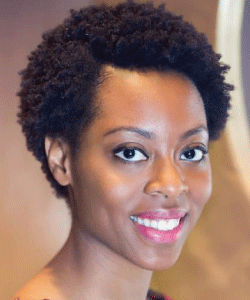First Person
Pitch Perfect: Exploring Black Women’s Emotional Coping Strategies

APS Graduate Student Affiliates put their persuasive powers to the test during the Pitch Perfect Three-Minute Thesis Competition at the APS 2021 Virtual Convention. Held for the first time in 2021, Pitch Perfect (sponsored by the APS Student Caucus) invited Graduate Student Affiliates to record a 3-minute video presentation on their current or proposed thesis or dissertation research that would demonstrate its significance to a nonscientific audience. Finalists, selected before the convention by a panel of judges, delivered their presentations before a live virtual audience on May 27.
Okie Nwakanma (Fordham University), who received first prize, spoke about how her upcoming research will spotlight the coping strategies Black women use to deal with gendered racism, the simultaneous experience of racism and sexism.

“While we work to dismantle racist and sexist systems that perpetuate inequality, those of us that are most affected must protect our psychological and emotional health right now,” Nwakanma said during her pitch, adding that some coping strategies may be more effective than others. Internalizing a “Superwoman schema” that emphasizes strength, self-reliance, and self-sacrifice, for example, may improve self-efficacy, but it has also been linked to depression and anxiety, she explained. Certain emotion-specific strategies such as rumination and avoidance have also been shown to have harmful long-term effects.
Instead, Nwakanma said, emotional-approach coping, which involves intentionally processing and expressing emotions, may help Black women deal with gendered racism in a way that protects their psychological well-being. Despite this potential, little research has focused on Black women’s use of emotional-approach coping in response to discrimination, a gap that Nwakanma aims to address through her thesis project. This study will investigate how emotional-approach coping impacts the relationship between gendered racism and psychological distress using survey data in addition to in-depth interviews with participants, she said.
“This approach grounds statistical results in Black women’s real-life experiences, which is particularly important given their limited inclusion in the existing literature,” she said. In addition to spotlighting how Black women may already use emotional-approach coping in their day-to-day lives, this work could also help to inform future therapeutic interventions.
“This research emphasizes the oft-forgotten truth, eloquently stated by Dr. Nyasha Junior, that Black women are human—we need love and care like everyone else,” Nwakanma said in closing.
Nwakanma’s first-place prize includes a $200 travel stipend as well as free registration to the 2022 APS Annual Convention in Chicago.
Back Page showcases particularly interesting work by a wide variety of psychological scientists. Know of a good candidate for a future profile? Contact the Observer at [email protected].
Feedback on this article? Email [email protected] or post a comment.





APS regularly opens certain online articles for discussion on our website. Effective February 2021, you must be a logged-in APS member to post comments. By posting a comment, you agree to our Community Guidelines and the display of your profile information, including your name and affiliation. Any opinions, findings, conclusions, or recommendations present in article comments are those of the writers and do not necessarily reflect the views of APS or the article’s author. For more information, please see our Community Guidelines.
Please login with your APS account to comment.